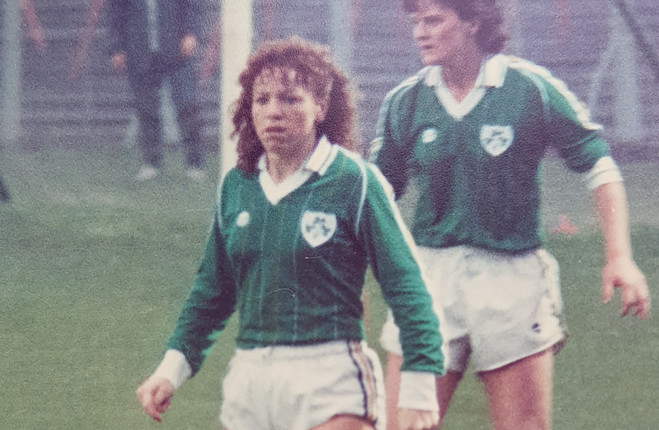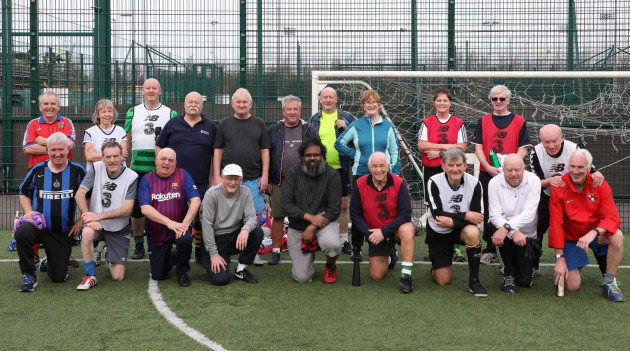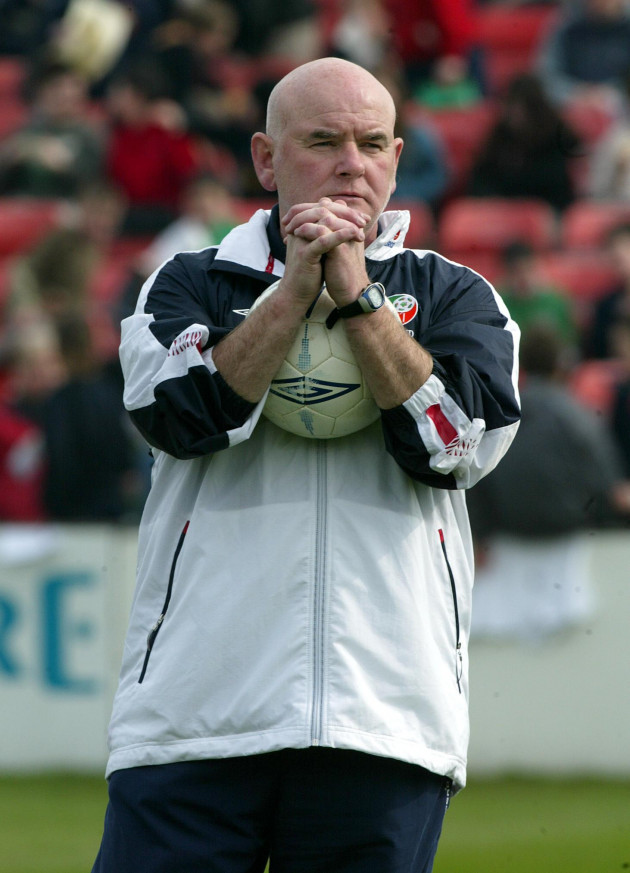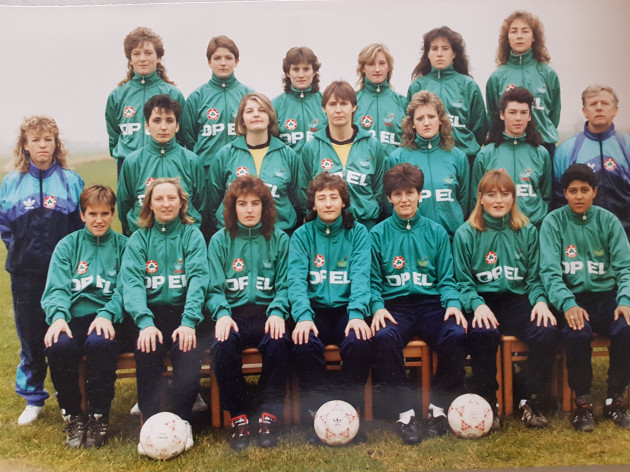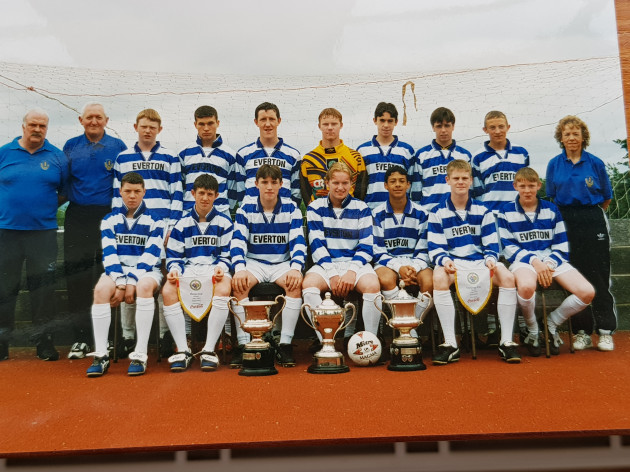30 YEARS ON from managing the Irish team, Linda Gorman is noticing a shift in the tone and expectations surrounding women’s football on this island.
We speak the day after what was undoubtedly one of the best results in Ireland’s footballing history — a 1-1 draw in a crucial qualifier away to Sweden, the team currently ranked second in the world, who finished third at the last World Cup and were a penalty shootout away from winning gold at last summer’s Olympics.
Gorman, meanwhile, is just back from a game of walking football in Abbotstown.
“Covid was getting to me a little bit, working from home,” she tells The42. “I would just be walking around the park at lunchtime, or whatever. And I saw these people playing and I thought that actually, one of them was a girl. You know the way you just look at people and say, ‘I could do that.’
“Anyway, I rooted around in the shed and found my old boots, and went over boots in hand and said: ‘Can I have a game?’
“And I’ve been doing it ever since, and I absolutely love it because of the quality of players. I’m playing with mostly men, maybe a few girls come along, but mostly I’m on my own. I didn’t think I’d ever get back to playing football.
“I stopped playing at 50-something. I’m 68 now. So yeah, it was a while but you know, I got involved in doing other stuff.”
The conversation that afternoon had largely revolved around Ireland’s commendable performance in Gothenburg.
“What’s surprising to guys that I play walking football with, some of them actually would have been [old fashioned] in terms of their ideas that women shouldn’t be playing football,” she explains.
“We always have a cup of tea after our game. And one of them said to me: ‘You know, I never thought girls could play football. But God, I’ve changed my mind now.’ One said to me: ‘I was looking at a Premier League game. I actually switched over stations and Ireland [women's team] were playing Australia. And I never switched back to the Premier League game.’
“And all the guys are talking about it. ‘Did you see the girls last night?’ And the guys played at a very high level themselves. You know, some of them would have played League of Ireland, some of them got away [abroad]. Really good footballers. We are a bit slower than we were. But the passion is still there.
“So the guys are actually talking about the women — you never heard that in my day.”
On the current Irish team, she adds: “I can see us moving up, if it keeps going the way it’s going. I think [Vera] Pauw is doing a great job. She’s getting the best out of players. She seems to have picked the best players for their best positions. She has them all geed up, they’re playing like a unit.”
The Irish side’s positive results have come about as a result of hard work both on and off the field in recent years.
Of course, it was not always this way. The squad’s past issues have been well-documented.
An Irish Times report from 1997 gives a sense of what it was like to play on the Irish women’s team in the bad old days.
Quoted in the piece, Irish captain Yvonne Lyons conveyed the chaos that sometimes marred Irish away trips and summed up the shambolic nature that often characterised women’s international football in that era.
“We flew into Frankfurt on the Friday, stayed there that night, flew to Minsk on the Saturday and then had a three-hour coach journey to Mogliev. It was terrible, we couldn’t believe the poverty there. The hotel we stayed in was something else, filthy dirty, run down, nobody would eat anything and all our food had gone missing.
“We brought these big huge containers of food but they never arrived in Mogliev — at that stage, we were all starving with the hunger. We wouldn’t eat anything in the hotel because we had been warned about it being so close to Chernobyl and were advised not to eat certain things. We had a box of Snickers and a supply of Ballygowan between 23 of us, so we survived on that for the 24 hours we were in Mogliev. I remember thinking at the time, no wonder Wales were hammered by Belarus because they stayed in our hotel for three or four nights.
“We went training on the Saturday night but no one would get into the baths when we got back — they had big holes in the side of them and they were covered in rust, so we were all going around smelly.
“At that stage, we were starving so we decided to try the restaurant but when we went down we found ourselves in the middle of a wedding party. There was a band playing, blaring this Russian music, we sat in the middle of all of this. Can you imagine, 23 footballers in the middle of this wedding? I don’t know who was more amused, us or them. One of the girls was whipped up by this fella to dance. Then they cooked us chips and chicken, but we just ate a few of the chips. The young kids were afraid of their lives to eat anything.”
That trip occurred five years after Gorman’s tenure as Irish manager had ended.
“I sort of moved a bit away from the girls’ football after I was, what would you say? Dumped out of the Irish job,” she remarks ruefully.
****
Gorman had grown up in Finglas and was the fifth-youngest in a big family of seven brothers and three sisters. In 1991, she became Ireland’s first-ever female manager, succeeding Fran Rooney in the role.
The tough-tackling attacking full-back had earned over 20 caps in a 13-year period with the Irish team, at a time where international matches were more sporadic and there were no qualifiers, with the first official Women’s World Cup not taking place until 1991. She made her debut against Northern Ireland in 1973 on a pitch just opposite the Red Cow Roundabout that is now home to Bluebell United.
“It was chalk and cheese to now,” she says. “It was like: ‘There’s a ball, go off and play.’ There was absolutely no interest [from most people].”
Coaches including Noel O’Reilly, Pat Cleary, John Doran, Noel King and Kevin Healy were among the notable exceptions to this rule and provided encouragement and guidance to Gorman throughout her career, while she cites Olivia O’Toole, Breda Hanlon, Marie Brown, Jackie McCarthy, Eithne Hennessy and Chrissie Buckley among the best players she played with and coached.
As continues to be the case today, albeit to a lesser extent, resources and support for women’s football were badly lacking at the time.
“Well, you know, either you get angry about it, or you pack the anger, and you just do it, and that’s what we did. We had no changing rooms, no training facilities. We trained in the Polo Grounds in the Phoenix Park. We trained in the snow. We had no toilet facilities, changing in the rain. There was absolutely nothing for us. Absolutely nothing.
“[Former Football Association of Ireland National Director of Coaching] John Jarman came in and they decided that they were going to select an international side. So they invited every single girl football player who was interested up to Carton House off the Naas Road for a weekend. And as far as I can remember, they got all the League of Ireland coaches to come down, and they took all the different groups. And then at the end of it, they whittled that down to I think 20 to 24 [players].
“[The first-ever manager of the Irish women's team] Eamonn Darcy came in, and he showed how simple it was to get sponsorship. And he got us so much stuff and put so much out there. It was unbelievable. One of our players, Bridie Flood, her company sponsored the first-ever caps for Ireland. The FAI didn’t do it. It was through Eamonn Darcy.
“But unfortunately, it went downhill when Eamonn stepped away. And then by the time I had stepped in [as manager], I just couldn’t hack how our own association wasn’t pushing the game, and the standards went back so low.
“My first game, we went to Spain. The way we were treated compared to the way we treated teams coming to Ireland was absolutely embarrassing and appalling.
“When we went away, they laid on a bus for us. They laid on food for us in hotels. Our accommodation was fantastic. They brought us anywhere we wanted to go and they were just amazing.
“They come here to Ireland. And we would go down to Bohs and have a takeaway in the bar in Bohs. And that wouldn’t have been the only thing.
“I remember when I played an international in Reims, the stadium was unbelievable. I thought this was what football was about, but not in Ireland.
“It was just, there was no interest in women playing football. They weren’t bringing any money into the FAI. So why spend any money on them?
“I was showing one of the [walking football] guys some stuff today, I actually got a form from the association, where you had to sign that you gave your gear back. We never got to keep our gear. Not your socks. Nothing.
“There was a coup because I think I was becoming a little bit stronger than the association and they had to get rid of me full stop.
“I was probably rocking the boat too much.”
It arguably took another 25 years from Gorman’s departure as manager to the famous team protest in 2017 for the Irish women’s squad to be treated with a measure of respect by the FAI and others.
Really, Gorman was making the same type of complaints a quarter of a century before change finally transpired, but had far less support when doing so.
“It’s sad to say that the current Irish team had to make a protest to get some type of equality and to tell people what the conditions were like playing for your country,” she says.
Being effectively ostracised from the Irish side is the type of setback that would put many individuals off football for life, particularly in the relatively small sphere of women’s sport, yet in many ways, it proved the making of Gorman.
As she explains: “I either had to say to myself: ‘Is this going to stop me from doing what I love to do? Or do I just [continue to] do what I’m doing. The politics of any organisation sometimes becomes too much. And you like to take a backseat and say: ‘I just want to coach, I don’t want to get involved in politics, let them do what they want to do. I just want to play.’ And that’s the attitude I had. Because otherwise, with all the obstacles in the way, I never would have done what I did. I never would have met great people. I never would have been influenced by great people. And probably one of the good things I did was make a difference to a lot of players.”
After the Irish job, Liam Tuohy — himself a former manager of the Irish men’s team — approached Gorman about coaching a women’s side in Home Farm that was being established.
“The very first thing I said to Liam was: ‘I’m not selling tickets to support the guys,’” she recalls. “And he said: ‘No.’ Because that’s what the perception was that the women could do. ‘The women will sell all the tickets for funding.’”
Gorman enjoyed swift success coaching the women’s team, winning two successive league titles.
“It was typical,” she adds. “Women played in the summer because the boys got to play in the winter. So the girls just took whatever was left of the pitches. There’s only a certain amount of pitches, and that’s often not enough.”
She continues: “I was really enjoying it, and I said to Liam Tuohy: ‘Is there any chance I could give one of the guys’ teams a dig out?’
“I think this was about November. And then after Christmas, he asked me was I still interested. It turned out that the manager for the 18s team had walked away over Christmas, and a guy called Joe Swaine and myself, Liam had asked us would we see the team out until the end of the season.
“Anyway, we won the league and the youth cup that year. And then the following year, the U15s team, needed a manager. Liam Tuohy asked me would I manage them. And I jumped at the chance.
“So I went with them up to the Milk Cup. And then I said: ‘Yeah, it has the makings of a great team here.’ We won the treble the first year I was with them. And I think I’m the only girl in the country who’s ever won the treble with a schoolboy side. You’re not going to hear about it. And it’s not going to be pushed out there. And I don’t care about that.
“The next year, with the 16s, we won the league and the League Cup. So it just got better and better, to be honest.”
Gorman spent roughly 10 years in total at Home Farm and credits Tuohy for paving the way for her success amid an era in which the idea of a woman coaching at schoolboy level was practically unheard of.
“Liam would have given me opportunities with schoolboy football that I don’t think any [other] girl would have gotten, particularly because it was a premier side, a lot of competition and money involved in terms of players going away. And so, I’ve been quite blessed.”
In addition to her achievements as a player and coaching Home Farm, as the Irish women’s team’s first-ever female manager (there have been just two others since — Sue Ronan and current boss Vera Pauw), Gorman is unquestionably a historic figure.
Yet her involvement in football has been more limited in recent times, as she pursued other areas of interest including a part-time degree in psychology at The Open University, while until her recent retirement, she was working a full-time job in training and development at Trinity College.
The outside commitments make her contribution to sport in this country all the more impressive, and yet there is a sense that she remains somewhat marginalised.
Does she feel her accomplishments have been properly recognised?
“I don’t really need anybody to validate me,” she says. “I’m gone past all that.
“I go back and I draw on the amazing opportunities I had, and more importantly, the amazing people I met, and the influences that they’ve had on my life. And I’m healthy, and I’m happy, and I’m doing what I like to do.”
